What is a prokary - Study guides, Class notes & Summaries
Looking for the best study guides, study notes and summaries about What is a prokary? On this page you'll find 9 study documents about What is a prokary.
All 9 results
Sort by
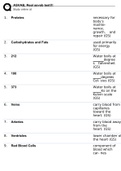
-
Real asvab test!!! Updated Spring 2023.
- Exam (elaborations) • 68 pages • 2023
-
- $13.49
- 2x sold
- + learn more
1. Proteins necessary for body's mainte- nance, growth, and repair (GS) 2. Carbohydrates and Fats used primarily for energy (GS) 3. 212 Water boils at degrees fahrenheit (GS) 4. 100 Water boils at degrees Cel- sius (GS) 5. 373 Water boils at Ks on the Kelvin scale (GS) 6. Veins carry blood from capillaries toward the heart. (GS) 7. Arteries carry blood away from the heart. (GS) 8. Ventricles lower chamber of the heart (GS) 9. Red Blood Cells component of blood which car- ri...
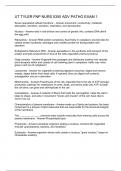
-
UT TYLER FNP NURS 5350 ADV PATHO EXAM 1.
- Exam (elaborations) • 6 pages • 2024
-
- $11.49
- + learn more
Seven specialized cellular functions: - Answer-movement, conductivity, metabolic absorption, secretion, excretion, respiration, and reproduction Nucleus - Answer-aids in cell division and control of genetic info, contains DNA (think the egg yolk) Ribosomes - Answer-RNA-protein complexes; float freely in cytoplasm; provide sites for cellular protein synthesis; packages and modifies protein for transportation and secretion Endoplasmic Reticulum (ER) - Answer-specializes in the synthesis a...

-
Bio 181 Exam 1 MCC QUESTIONS WITH COMPLETE SOLUTIONS
- Exam (elaborations) • 9 pages • 2023
- Available in package deal
-
- $12.49
- + learn more
Emergent Property correct answer: New properties that arise with each step upward in the hierarchy of life, owing to the arrangement and interactions of parts as complexity increases. Biological Organization correct answer: 1. Biosphere 2. Ecosystem 3. Communities 4. Populations 5. Organisms 6. Organs and Organ Systems 7. Tissues 8. Cells 9. Organelles 10. Molecules Properties of life correct answer: 1. Order 2. Regulation 3. Energy Processing 4. Evolutionary Adaptation 5...
AC-HPAT Exam Prep 2023 with complete solution;Biology, Chemistry, Physics, Math
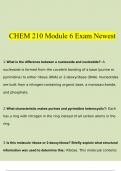
-
CHEM 210 Module 6 Exam Newest
- Exam (elaborations) • 4 pages • 2024
-
- $8.99
- + learn more
CHEM 210 Module 6 Exam Newest 1. What is the difference between a nucleoside and nucleotide?: A nucleoside is formed from the covalent bonding of a base (purine or pyrimidine) to either ribose (RNA) or 2-deoxyribose (DNA). Nucleotides are built from a nitrogen-containing organic base, a monosaccharide, and phosphate. 2. What characteristic makes purines and pyrimidine heterocyclic?: Each has a ring with nitrogen in the ring instead of all carbon atoms in the ring. 3. Is this molec...
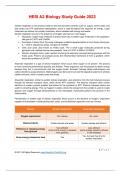
-
HESI A2 Biology Study Guide 2023
- Exam (elaborations) • 47 pages • 2024
- Available in package deal
-
- $17.99
- + learn more
HESI A2 Biology Study Guide 2023 Cellular respiration is the process inside of cells that converts nutrients (such as sugars, amino acids, and fatty acids) into ATP (adenosine triphosphate), which is used throughout the organism for energy. Large molecules are broken into smaller molecules, which releases both energy and waste. Aerobic respiration occurs in the presence of Oxygen and has four main stages: Glycolysis: Larger sugar molecule is broken down into 2 smaller sugar molecules in...
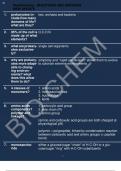
-
Biochemistry - QUESTIONS AND ANSWERS NEW UPDATE
- Exam (elaborations) • 16 pages • 2024
-
- $21.99
- + learn more
1. prokaryotes in- clude how many domains of life? what are they? 2. 95% of the cell is made up of what elements? 3. what are prokary- otes exclusive- ly? 4. why are prokary- otes more adapt- able to chang- ing environ- ments? what does this allow them to do? 5. 4 classes of monomers? 6. amino acids components? polymer and linkage? 7. monosaccha- ride two, archaea and bacteria O,C,H,N single cell organisms simplicity and *rapid cell division* allows the...
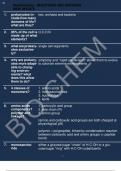
-
Biochemistry - QUESTIONS AND ANSWERS NEW UPDATE
- Exam (elaborations) • 16 pages • 2024
-
- $21.49
- + learn more
1. prokaryotes in- clude how many domains of life? what are they? 2. 95% of the cell is made up of what elements? 3. what are prokary- otes exclusive- ly? 4. why are prokary- otes more adapt- able to chang- ing environ- ments? what does this allow them to do? 5. 4 classes of monomers? 6. amino acids components? polymer and linkage? 7. monosaccha- ride two, archaea and bacteria O,C,H,N single cell organisms simplicity and *rapid cell division* allows the...

-
2022 AQA GCSE Biology Paper 1 with complete solutions
- Exam (elaborations) • 40 pages • 2022
-
- $10.49
- + learn more
What are the two types of cells? ● Eukaryotic (plant and animal) ● Prokaryotic (bacteria) What are the differences between eukaryotic and prokaryotic cells? Prokaryotic cells are much smaller than eukaryotic cells. Eukaryotic cells contain membrane bound-organelles and a nucleus containing genetic material, while prokaryotes do not. 01:04 01:14 How is genetic information stored in a prokaryotic cell? Found free within the cytoplasm as: ● Chromosomal DNA (single la...

Do you wonder why so many students wear nice clothes, have money to spare and enjoy tons of free time? Well, they sell on Stuvia! Imagine your study notes being downloaded a dozen times for $15 each. Every. Single. Day. Discover all about earning on Stuvia



